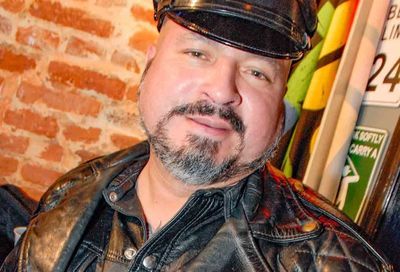DeSantis Claims Supreme Court Won’t Overturn Gay Marriage
Florida governor commits to appointing conservative judges to court, but claims status quo on same-sex nuptials will continue.

Presidential candidate and Florida Gov. Ron DeSantis has claimed that the status quo on same-sex marriage would remain unchanged should he be elected president, despite his pledge to appoint strict constructionist conservatives to the nation’s highest court.
Speaking with journalist Norah O’Donnell in an interview for CBS Evening News, DeSantis defended the state from accusations that it is a hostile environment for Black people, other individuals of color, or the LGBTQ community.
DeSantis defended his record on racial issues as governor, noting that unemployment among Blacks in Florida is lower than in liberal-leaning states, that record numbers of Blacks own their own businesses in Florida, and that the state has the highest number of Black students benefitting from school-choice programs.
Responding to the NAACP’s issuance of a travel advisory declaring the state as adversarial toward Black Americans — a charge sparked by his administration’s various attempts to crack down on so-called “wokeness” and discussions of systemic racial inequality — a “stunt.” The racial advocacy organization previously called Florida “openly hostile for African Americans, people of color, and LGBTQ individuals.”
DeSantis also blamed the media for fueling what he calls false narratives that the state is hostile to LGBTQ people.
“When we had the fight with Disney over the elementary education about, should you have things about sex and gender identity telling a second grader that their gender’s fluid? We said, ‘Absolutely not.’ Parents in Florida agreed. And throughout — the country I think agreed with that,” he said.
He noted that the “Parental Rights in Education” bill, which has been dubbed the “Don’t Say Gay” bill by detractors for barring discussions of LGBTQ-related topics in K-12 schools, never explicitly mentioned the word “gay,” but was focused on ensuring that kids weren’t being encouraged to identify as transgender or socially transition without their parents’ knowledge.
“I never said that gay people wanted kindergartners to be told they can change their gender. That was the media that created that and the Left that created that,” he claimed.
Keeping the discussion on LGBTQ rights, O’Donnell asked the governor if, as president, he would appoint a U.S. Supreme Court justice who would vote to reverse the high court’s 2015 Obergefell v. Hodges decision that struck down state bans on same-sex marriage nationwide.
DeSantis didn’t answer, but echoed arguments made by Justice Samuel Alito in the Dobbs case, which reversed the court’s decades-old finding in the landmark abortion case Roe v. Wade.
DeSantis said he thinks the court views its precedent set in Obergefell as different from the precedent set by Roe, and doesn’t expect the court to re-litigate the issue of same-sex marriage — effectively preserving the status quo.
“You know, I’ve already said in terms of, in terms of Obergefell, that what the court pointed out, and the other justices, was reliance interest is important with respect to precedent,” DeSantis told O’Donnell. “And I think all those other eight justices have signaled that, because there’s a significant reliance interest, that they would not view that the same as they did with Dobbs. And I think that’s likely…to be the case going forward. I don’t think you’re gonna see them re-evaluate that.”
That said, DeSantis insisted that he would appoint conservatives to the Supreme Court who embrace a strict constructionist, or textualist, viewpoint — a legal theory in which the only rights recognized by the court are those that are explicitly mentioned in the text of the U.S. Constitution and federal laws.
“In terms of the justices I would appoint, you know, they will interpret the text, history and structure of the constitution and they will do that faithfully,” he said.
DeSantis’s suggestion that a more conservative court wouldn’t overturn Obergefell aligns with his previously expressed view that the Respect for Marriage Act — a federal law, signed into effect by President Joe Biden last December, that ensures same-sex and interracial marriages will continue to be recognized by the federal government should the Supreme Court reverse its own precedent — was unnecessary.
However, proponents of the Respect for Marriage Act noted that Justice Clarence Thomas suggested, in a dissent in the Dobbs case, that the court revisit several past cases, including Obergefell, that he believes were wrongly decided.
At the time the bill was signed, opponents, including DeSantis, claimed that the bill might infringe on people’s religious freedoms, expressing concern about religious institutions — which continue, under the law, to enjoy protections, such as being empowered to refuse to perform same-sex nuptials.
Additionally, the bill allows states with gay-marriage ban still on the books to refuse to issue marriage licenses to same-sex couples, although they must recognize valid same-sex marriage licenses from other states.
His past stated opposition to same-sex marriage, in general, may lead some voters — especially LGBTQ conservatives or voters predisposed to vote for a Republican for president — to use his statements on the court and gay marriage to paint him as “reasonable” and downplay his record championing of restrictions on LGBTQ rights and visibility.
He previously defended his record as governor and a decision by his campaign to tout a much-criticized ad that critics panned as homophobic, saying, “I don’t believe in demeaning anybody, and we have not done that since I’ve been governor.”
As Florida Politics reports, DeSantis’s views on the issue will be scrutinized should he win the Republican presidential nomination or be elected, as he would find himself poised to appoint as many as four new justices, thereby reshaping the court — and with it, the political and cultural landscape — for the next several decades.
Addressing the National Religious Broadcasters Convention in May, DeSantis said, “The U.S. Supreme Court with some of the recent appointments is in a much better spot than it’s been in a long time. But I think if you look over, you know, the next two presidential terms, there is a good chance that you could be called upon to seek replacements for Justice Clarence Thomas and Justice Samuel Alito,” DeSantis said.
“I also think if you, if you look over those eight years, you very well could be called upon to replace Chief Justice John Roberts and perhaps even someone like Justice Sonia Sotomayor,” he added. “So it is possible that in those eight years, we’d have the opportunity to fortify justices, Alito and Thomas as well as actually make improvements with those others. And if you were able to do that, you would have a 7 to 2 conservative majority on the Supreme Court that would last a quarter century.”
Support Metro Weekly’s Journalism
These are challenging times for news organizations. And yet it’s crucial we stay active and provide vital resources and information to both our local readers and the world. So won’t you please take a moment and consider supporting Metro Weekly with a membership? For as little as $5 a month, you can help ensure Metro Weekly magazine and MetroWeekly.com remain free, viable resources as we provide the best, most diverse, culturally-resonant LGBTQ coverage in both the D.C. region and around the world. Memberships come with exclusive perks and discounts, your own personal digital delivery of each week’s magazine (and an archive), access to our Member's Lounge when it launches this fall, and exclusive members-only items like Metro Weekly Membership Mugs and Tote Bags! Check out all our membership levels here and please join us today!



















